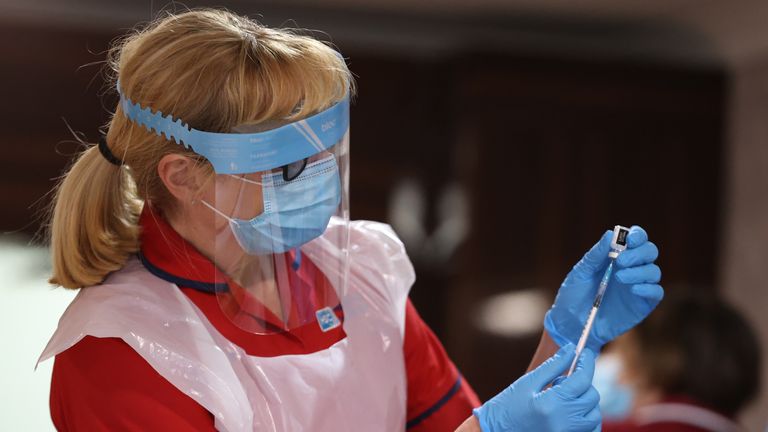A third of people in the UK have seen conspiracy theories discouraging against getting a coronavirus vaccine, a study suggests.
Many of these false anti-vaccination messages were shared on social media, according to research by King's College London and Ipsos Mori.
The report found 34% of people surveyed had seen antivax messages, while around 40% of people who get their information from platforms such as WhatsApp or YouTube were more likely to believe conspiracy theories about COVID vaccines.
Young people who got a lot of their information from social media were more likely to believe conspiracies.
Around 15% of those studied said they believe a vaccine is only being developed to make money for pharmaceutical companies, with this number rising to 39% of those who get a lot of information from WhatsApp and 37% from YouTube.
Experts fear disinformation could undermine efforts to vaccinate the population after the UK became the first western country to roll out a COVID-19 vaccine outside of trials.
Professor Bobby Duffy, director of the Policy Institute at King's College London, said more work should be done with social media platforms to stamp out disinformation.
"It's clear that some harmful views have taken hold among a minority of the public," he said.
"They range from concerns about whether the UK government will ensure the safety of the coronavirus vaccine to particularly extreme conspiracy theories, such as that the real purpose of the vaccination effort is to track and control the population - which is believed by one in seven, and greater proportions of young people and social media users.
"Working with social media platforms to control the spread of misinformation is therefore an important action - but the main focus should not be on this niche belief in extreme conspiracies. People who believe in these theories still form a small minority, and many of them will be very difficult to convince.
"Instead, we need to focus on the much larger sections of the public who say they're unsure about the truth of some of the medical implications of vaccination, such as the 42% who say they don't know if it may cause autism in children and the 48% who are unsure whether it might cause infertility."
He added it was "essential" to use transparent and consistent public health messaging to allay any concerns.
Social media platforms are often criticised for their handling of misinformation of harmful content.
Kelly Beaver, managing director of Ipsos Mori public affairs, said it was "concerning" to see the impact of conspiracy theories on people's views.
"Vaccines have been one of the greatest medical interventions over the last two centuries. We cannot afford to take a backwards step," she said.





